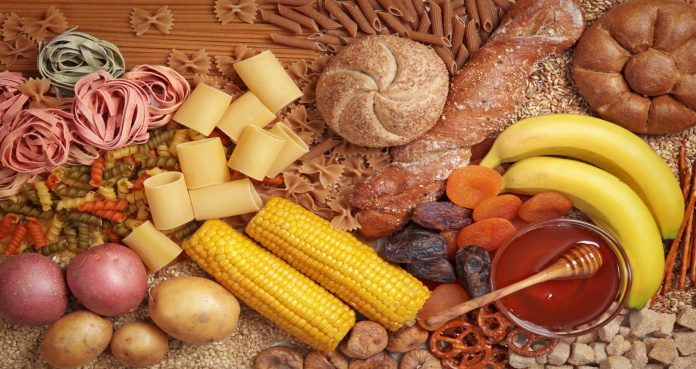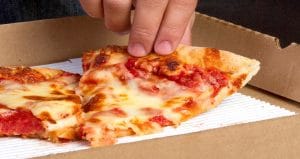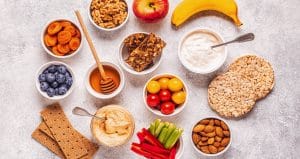
What impact do carbs at night really have?
Growing up, you were drilled with the message to never eat at night. Eating at night is for losers who accumulate body fat right? And if you do eat at night, definitely don’t eat carbs. Carbs will kill your dreams, take everything you love, and make you fatter than an obese Oompa Loompa right?
Oh how we believe such fake news. Crap like this is tattooed in our brains since childhood yet the science doesn’t support it. Let me break down the nuances of nighttime eating.
Sleeping Metabolic Rate Myths
So one of the most common misconceptions about eating at night is your metabolism. People throw around this word as if they understand what it means. What they usually mean is your metabolic rate which is how rapid you burn calories at rest.
People argue that eating at night is detrimental because when you go to sleep, you’re no longer active, so these calories fatten you up like a pig. Oink oink anybody?
All jokes aside, sleeping metabolic rate isn’t much different from your waking metabolic rate. When you first fall asleep, your metabolic rate drops a bit, but as sleep related bodily processes begin, energy expenditure also comes back up (1-4).
In addition, exercise also increases your sleeping metabolic rate likely due to the energy cost of repairing and building muscle (5).

Energy Balance
All of this is neither here nor there though because eating nets you body fat storage no matter how fast your metabolic rate is. For example, when you eat a 600 calories meal, you can’t burn off 600 calories in the time it takes to eat that meal. You’re going to burn a certain amount throughout a 24 hour period, so the total food you eat matters, not when you make fat deposits from consuming meals.
So how much you eat will be distributed at various meal times in which fat will be stored. The day as a whole is your opportunity to burn enough calories to put you in the energy balance you want.
So eating an entire cake as a midnight snack isn’t bad because it’s done in the dark. It’s bad because well, you’re eating an entire cake. It’s no better if you were to eat that cake in the morning. Calories don’t magically get more fattening past 6 pm or whatever random time you’ve heard.
Carb Backloading
However, if you do have the correct energy balance, that’s not to say meal timing is meaningless. Certain nutrients interact at certain times. We have some research indicating the opposite of what many people have been taught about pre-bed carbs.
Many people don’t realize, night time eating can be beneficial. Again, this is in the context of an overall calorically controlled diet, not simply using this as an excuse to eat an extra dinner and hit up the local dessert buffet.
Anyways, this idea is called carb backloading and was once highly popular in the fitness industry. The idea is to push more of your calories/carbohydrates towards the later part of the day or the evening. Some of my clients who carb backload like to push almost all of their carbs to the final meal similar to one study I’ll talk about.
Let’s look at the studies for this along with some practical rationale to consider.

The Research
If you look at cross sectional or epidemiological studies, they’re quite mixed, but many show fatter people often eat at night, but correlation doesn’t equal causation. When you take a closer look, unhealthy people simply eat too much and have no structure or planning surrounding their food.
More controlled studies paint a different picture.
Before the 21st century even began, Keim et al. conducted a study in a metabolic ward which is super fancy chamber to control and monitor energy balance (6).
Both groups ate macro matched diets, but one group ate 70% of their calories in the AM while the other group ate 70% of their calories in the PM. All food was provided.
Exercise was also implemented with both strength training and cardio, so this applies more to this audience as well.
The PM group had far better body composition and muscle retention. The AM group lost quite a bit more muscle. Both groups lost fat.
Moving into the 21st century, we have Sofer et al which was an infamous study done in 78 Isreaeli police officers across 6 months with lots of tests done on weight loss and hormonal profiles (7). This study specifically had one group eat all the carbs early while the other group ate all their carbs at dinner.
Many people would predict the carbs at night group to get worse results. Not quite. In fact, the PM carb group experienced better fat/weight loss, decrease in fasting insulin levels, lower inflammation, and better cholesterol.
Some of these effects can be attributed to more weight loss which is a remarkable benefit alone, but they can also be attributed to how carbohydrates sync with your body’s hormonal cycles during the night.
Leptin and adiponectin are 2 beneficial hormones that aid in satiety. They can decrease at night naturally. But having more carbs at night can alter these levels according to the Sofer study.
Carbohydrates also promote serotonin levels to help you feel happy and relaxed along with melatonin levels at night which helps you fall asleep. We have lots of studies on carbohydrate rich foods helping people fall asleep (8).
Practical Benefits of Pre-bed Carbs
You ever start the day and it’s chaos out the gate? Show of hands? Yeah, me too. I can only imagine how bad it is for people with children and extremely stressful jobs. You go through the day, somehow make it out alive, come home to more responsibilities, and guess what?
You want to devour everything. Your brain wants some pleasure and it’s hunger is ravenous.
However, if you consumed lots of calories during the day, you don’t get to eat many after work unless you want to gain body fat. So backloading calories/carbs is highly practical here. Think about it.
During the day, you’re at work. If you’re truly busy and have back-to-back responsibilities or meetings, you shouldn’t be thinking about food. Being occupied has been shown to be an extremely powerful appetite suppressant.
So not eating as much during the day when you’re busy and not hungry to allow for more nighttime calories is practical. Furthermore, many people eat with their families or go out for dinner. Having more calories and carbohydrates to be flexible with can either make or break the adherence of your diet.
Give carb backloading a try if you haven’t yet. It doesn’t have to be super close to bed time to reap the sleep benefits. Anytime during the evening time should be fine and may even prevent that late night snacky type hunger.
For more news and updates, follow Generation Iron on Facebook, Twitter, and Instagram.
References
- Katayose Y;Tasaki M;Ogata H;Nakata Y;Tokuyama K;Satoh M; “Metabolic Rate and Fuel Utilization During Sleep Assessed by Whole-Body Indirect Calorimetry.” Metabolism: Clinical and Experimental, U.S. National Library of Medicine, pubmed.ncbi.nlm.nih.gov/19394978/.
- JM;, Seale JL;Conway. “Relationship Between Overnight Energy Expenditure and BMR Measured in a Room-Sized Calorimeter.” European Journal of Clinical Nutrition, U.S. National Library of Medicine, pubmed.ncbi.nlm.nih.gov/10099943/.
- Zhang K;Sun M;Werner P;Kovera AJ;Albu J;Pi-Sunyer FX;Boozer CN; “Sleeping Metabolic Rate in Relation to Body Mass Index and Body Composition.” International Journal of Obesity and Related Metabolic Disorders : Journal of the International Association for the Study of Obesity, U.S. National Library of Medicine, pubmed.ncbi.nlm.nih.gov/11896493/.
- Kumahara H;Yoshioka M;Yoshitake Y;Shindo M;Schutz Y;Tanaka H; “The Difference Between the Basal Metabolic Rate and the Sleeping Metabolic Rate in Japanese.” Journal of Nutritional Science and Vitaminology, U.S. National Library of Medicine, pubmed.ncbi.nlm.nih.gov/15895522/.
- Mischler I;Vermorel M;Montaurier C;Mounier R;Pialoux V;Péquignot JM;Cottet-Emard JM;Coudert J;Fellmann N; “Prolonged Daytime Exercise Repeated Over 4 Days Increases Sleeping Heart Rate and Metabolic Rate.” Canadian Journal of Applied Physiology = Revue Canadienne De Physiologie Appliquee, U.S. National Library of Medicine, pubmed.ncbi.nlm.nih.gov/12904638/.
- Keim, et al. “Weight Loss Is Greater with Consumption of Large Morning Meals and Fat-Free Mass Is Preserved with Large Evening Meals in Women on a Controlled Weight Reduction Regimen.” OUP Academic, Oxford University Press, 1 Jan. 1997, academic.oup.com/jn/article/127/1/75/4728738.
- Sofer S;Eliraz A;Kaplan S;Voet H;Fink G;Kima T;Madar Z; “Greater Weight Loss and Hormonal Changes After 6 Months Diet With Carbohydrates Eaten Mostly at Dinner.” Obesity (Silver Spring, Md.), U.S. National Library of Medicine, pubmed.ncbi.nlm.nih.gov/21475137/.
- Vlahoyiannis, Angelos, et al. “A Systematic Review, Meta-Analysis and Meta-Regression on the Effects of Carbohydrates on Sleep.” MDPI, Multidisciplinary Digital Publishing Institute, 14 Apr. 2021, www.mdpi.com/2072-6643/13/4/1283/htm.
